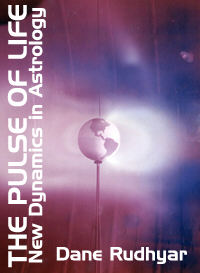 |
| Home | Bio | Art | Music | Literature | Civilization & Culture | Philosophy of Wholeness | Theosophy & Spirituality | Astrology |

Part Two:
Twelve Phases of Human Experience LEO - Page 1 of 3 Throughout the stage of human experience represented by Cancer two basic needs are impressed upon the evolving personality. One of them is the need for a clear cut focusing — and thus limiting — of the energies of the Day-force whose strength had become overwhelming; the other is the need to assume responsibility toward one's fellow men and to participate consciously in the life of a social whole. While the Day-force can be defined as a "personalizing energy," forcing into concrete and particular actuality abstract patterns, ideas or spiritual entities, the Night-force is an "in-gathering energy" bringing personalities together in the process of building social groups. The foundation of that social process is — at least in our present phase of human development — the home and family. Cancer is the symbol of that foundation, the well-spring of the Night-force which will wax in strength and influence until the winter solstice is reached with Capricorn (the symbol of completely organized social living: the all-powerful State). The zodiacal Sign Leo represents the second phase of that social process. In Leo, the power that compelled the individual man and woman to limit, stabilize and deepen each other within the social root-pattern of a home, is now urging them to create a progeny. Thus, they are made to assume a new social responsibility. A new field of integration is opened up: the integration of parents to children, of older to younger generations. Out of this, truly social issues will arise; problems of relationship which cannot easily be broken because they involve the responsibility of the "present" (which is constantly becoming the "past") to the "future." Thus time begins to lay its weight upon the individual's consciousness. Time is a very powerful factor in all creative activity and all social relationships. We might say that time means very little in normal adolescence; that it is lost in the glamour of love during the honeymoon. But when the child (and all creative activities) brings to the parents a new burden of responsibility, then time begins to be an actual, often poignant reality. The woman knows it for the first time with the depth of her being through her nine-month pregnancy. The man experiences it through the discipline of a "schedule of work" in the life of social activity and responsibility which then begins to confront him. He experiences it as a father at home, and as an executive or manager in the sphere of his work, even if he "manages" only his own tasks. When we wrote "for the first time" and "begins to experience" we were obviously referring to conditions of living such as prevailed in archaic societies based on the normal rhythm of biological growth; societies such as, for instance, prevailed in the India of old. Modern societies, on the other hand, are transitional affairs, chaotic, non-organized; and thus the normal biological-psychological rhythm of human development, which the Zodiac accurately symbolizes, no longer operates with clarity or precision. Yet the Zodiac remains a potent symbol of a natural process which some day will again serve as a basis for the organization of society and even of personality. It will be a kind of organization encompassing much more than the old civilizations did include, an organization at several levels of human activity; but it will be organization just the same, and along natural lines made visible by the symbolic pageant of Sun, Moon and stars. By permission of Leyla Rudhyar Hill Copyright © 1943 by David McKay Company and Copyright © 1970 by Dane Rudhyar All Rights Reserved.  Web design and all data, text and graphics appearing on this site are protected by US and International Copyright and are not to be reproduced, distributed, circulated, offered for sale, or given away, in any form, by any means, electronic or conventional. See Notices for full copyright statement and conditions of use. Web design copyright © 2000-2004 by Michael R. Meyer. All Rights Reserved. |
 |
